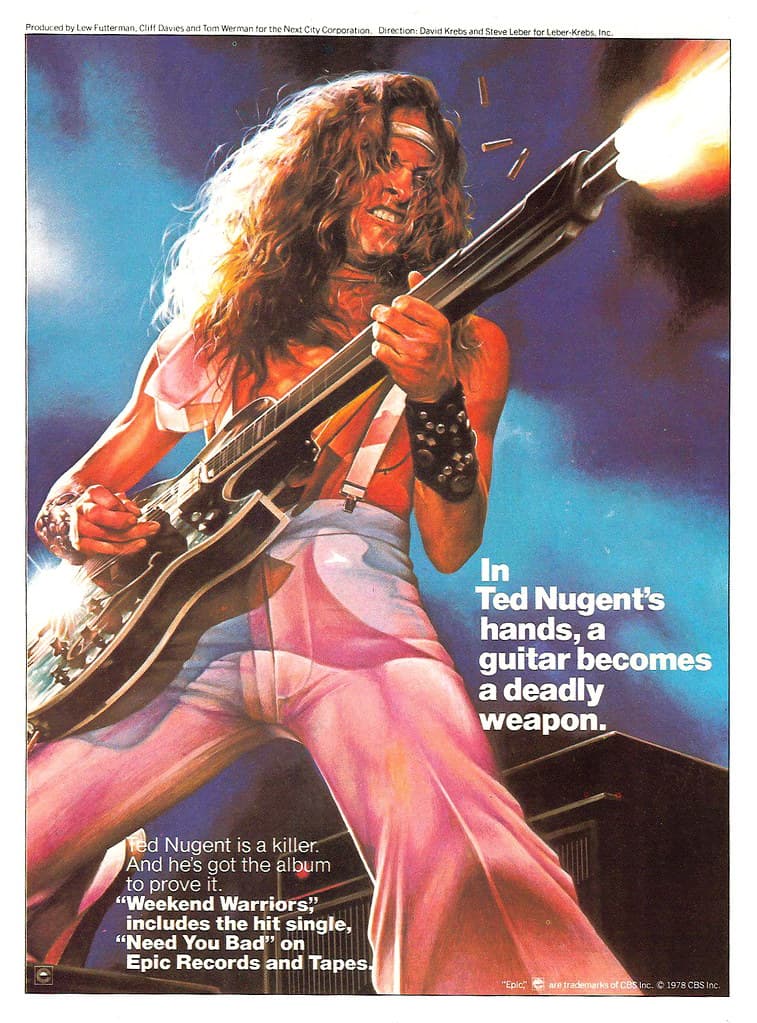
The year 1976 marked a pinnacle for the hard rock scene, with Ted Nugent charging through it like an unstoppable force. His sophomore solo effort, Free-for-All, solidified his position as a platinum-selling powerhouse, following closely on the heels of his acclaimed self-titled debut. The album soared to No. 24 on the US Billboard 200 and No. 33 on the UK Albums Chart, a testament to its raw energy and enduring appeal. Yet beneath its surface of unrelenting riffs and thunderous percussion lay a compelling story of tension and unexpected collaboration, a drama grippingly embodied by the epic seven-minute track “Writing on the Wall.”
This sprawling third track on the album’s opening side was never released as a standalone single, instead serving as a pivotal moment within the greater album experience. Like many of the extended compositions on Nugent’s early catalog, “Writing on the Wall” weaves intricate guitar heroics with weighty themes, designed to captivate an audience immersed in the vinyl era’s immersive storytelling tradition. Its length and lyrical depth mark it as a standout piece — an audacious statement steeped in the era’s relentless sense of rock excess and spiritual consequence.
Behind this monumental song lies a turbulent chapter in Nugent’s career. The band’s core synergy was fraying, particularly the relationship with lead vocalist Derek St. Holmes. According to insiders, St. Holmes abruptly walked away from the recording sessions for Free-for-All, leaving a critical gap in the vocal lineup just as momentum was building. Stepping into this void was none other than Meat Loaf, then an emerging figure from the theatrical rock circuit.
“When Derek left the studio, we were scrambling. Meat Loaf was a wild card — everyone knew he had a voice that could move mountains, but no one expected him to step in so seamlessly,” recalled **John Rollo**, the album’s recording engineer.
Meat Loaf lent his booming, soulful, and operatic voice to four tracks, including the monumental “Writing on the Wall.” His dramatic delivery contrasted sharply with St. Holmes’s bluesier style, infusing the album with a rare fusion of styles and energies. This unexpected partnership remains one of rock’s most intriguing stories of “what might have been,” an unplanned collision that nevertheless forged a powerful artistic statement.
The song’s lyrical content plunges deep into the allegorical and the ominous. Drawing inspiration from the biblical tale of Belshazzar’s feast found in the Book of Daniel, the track evokes the chilling image of a spectral hand inscribing a message of divine judgment upon the palace wall — a prophetic signal of imminent catastrophe. Though Ronnie James Dio, known for his cryptic and mythical lyricism, was not involved in this particular Nugent project, the thematic resonance is unmistakably grand and foreboding.
“Ted’s riff in ‘Writing on the Wall’ punches like thunder, but the meaning sings the warning loudest — it’s a call to stop the reckless path before the inevitable crash,” explained **Maria Jensen**, a rock historian specializing in 1970s metal and hard rock.
The lyrics condemn a lifestyle dominated by careless indulgence and unbridled excess, warning of an inescapable day of reckoning. The guitar-driven fury mimics the angry hand writing doom on the wall, underscoring the song’s message with an urgency and rawness that few tracks of the period could match.
For the legions of rock fans who purchased Free-for-All on vinyl back in ’76, the memory of this track holds a special, nostalgic poignancy. The sheer theatricality of Meat Loaf’s soaring vocals layered over Nugent’s blistering guitar riffs delivers a sonic collision that both astonished and captivated listeners.
“When you hear Meat Loaf howl on ‘Writing on the Wall,’ it’s like the album’s spirit is channeling something larger than life itself — a story of chaos, tension, and a warning no one could ignore,” reminisced **Danny McClure**, a long-time fan and collector of Nugent’s records.
The convergence of talent and tension on this track encapsulates the wild spirit of 1970s rock – a time when the biggest dramas were often not happening on stage in front of screaming audiences, but behind closed doors in the recording studio. The unresolved conflicts, sudden departures, and impromptu collaborations forged moments of raw, breathtaking artistry that still echo decades later.
“It was a perfect storm — the right mix of frustration, urgency, and untamed creativity. ‘Writing on the Wall’ isn’t just a song; it’s a snapshot of rock’s most volatile moments,” affirmed **Tony Vasquez**, a music journalist who has chronicled rock’s golden age.
Far more than just a filler track on a platinum album, “Writing on the Wall” endures as a poignant reminder of the consequences awaiting those who live recklessly, wrapped in a dramatic musical package that continues to resonate with listeners who appreciate both fiery guitar work and portentous storytelling.